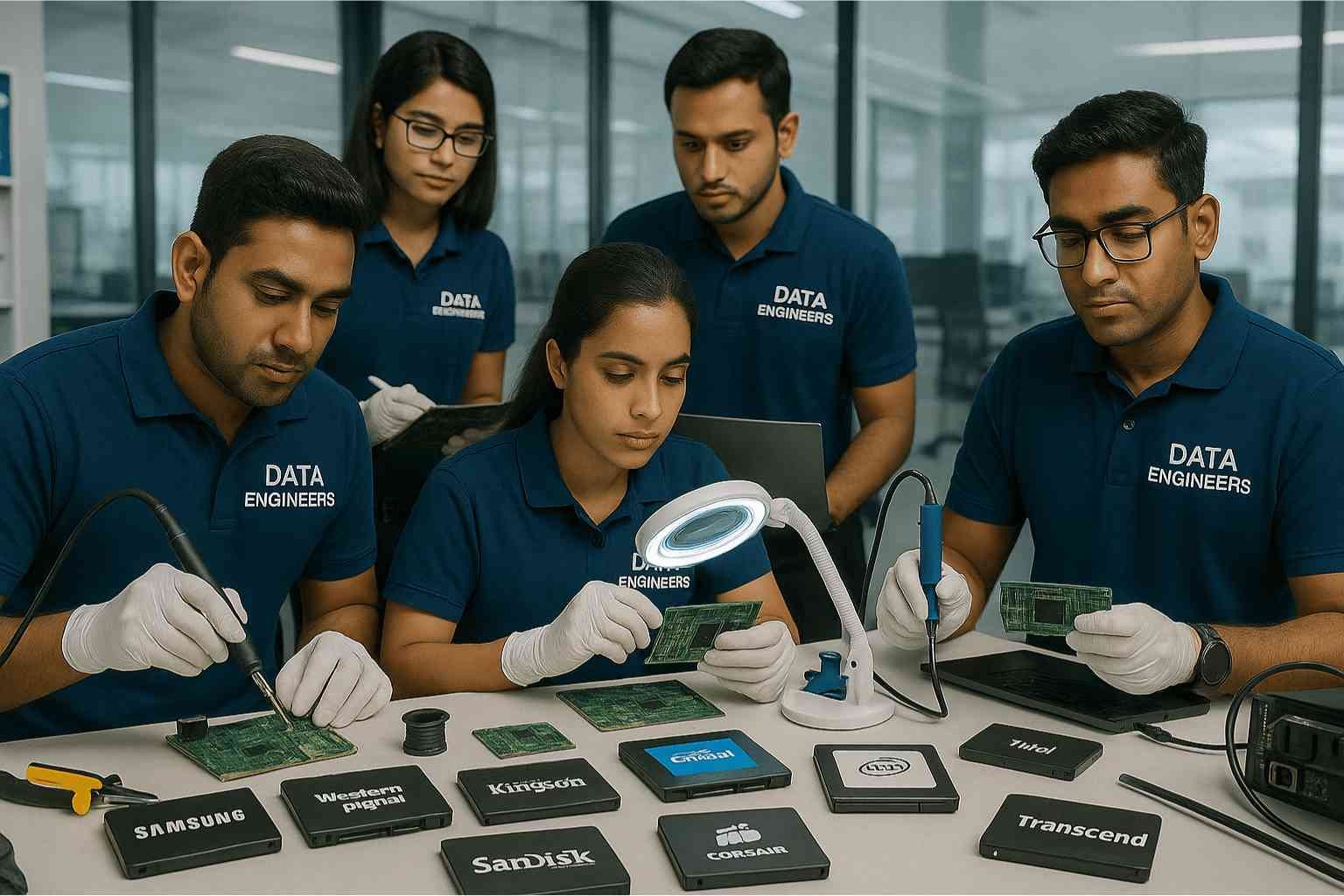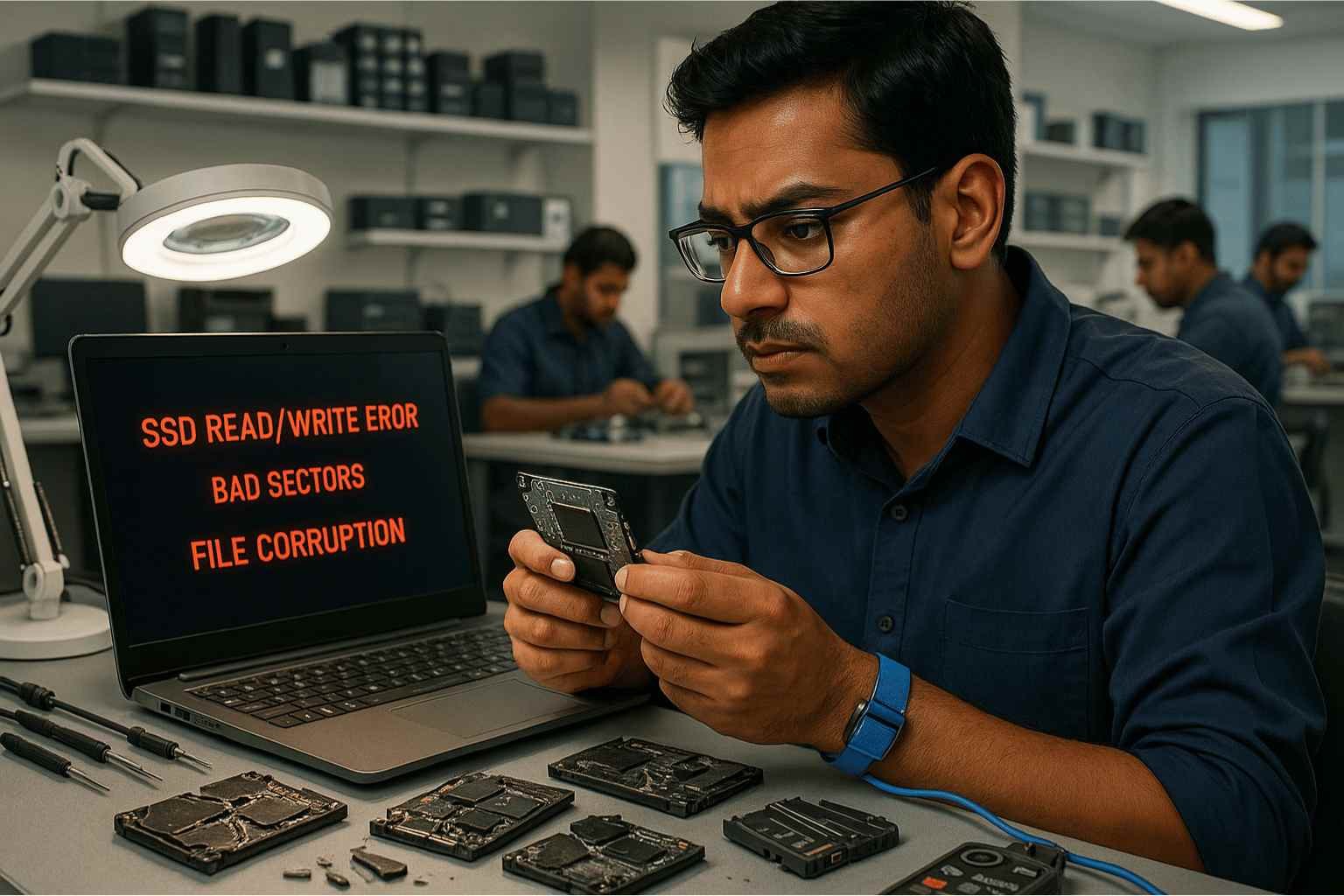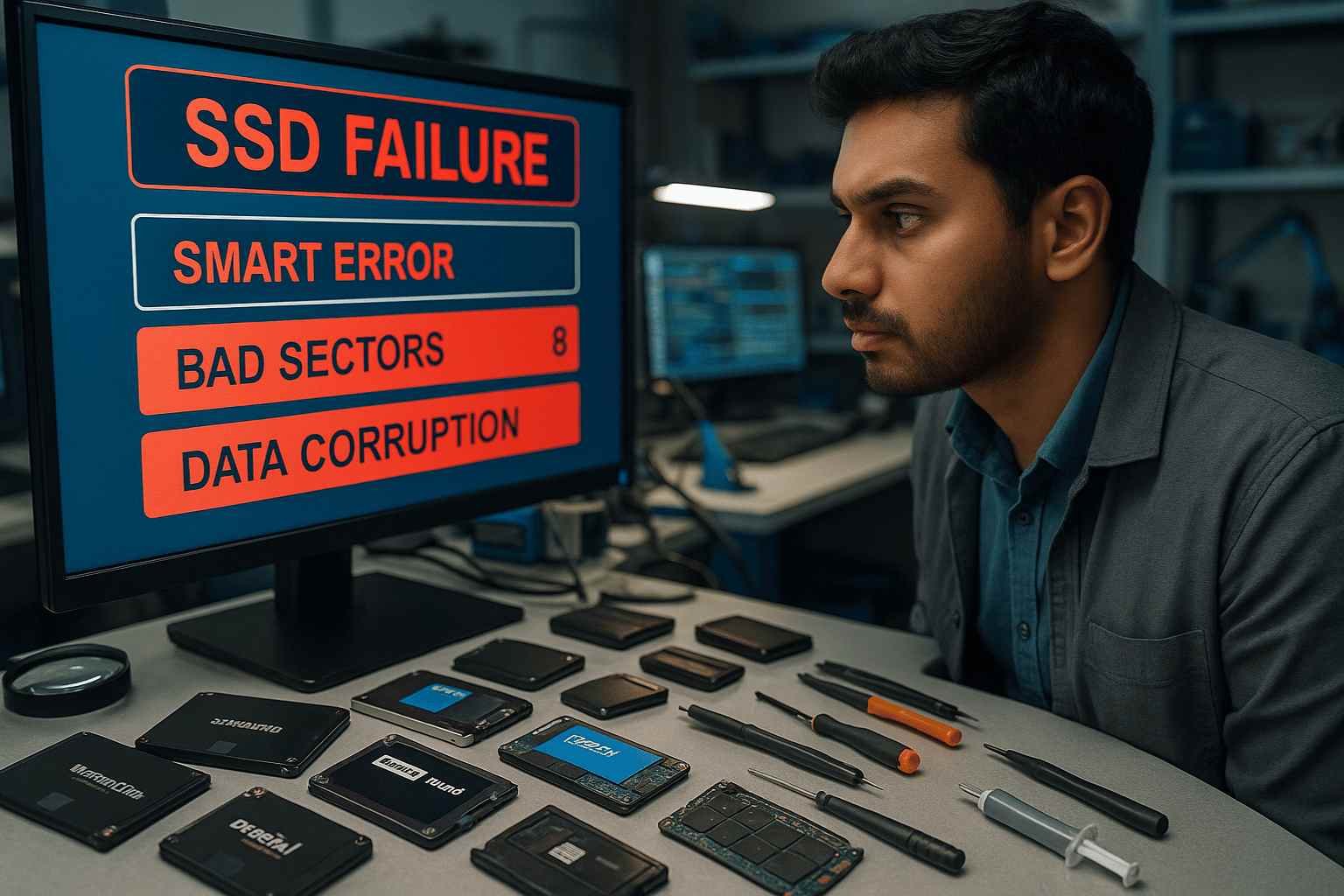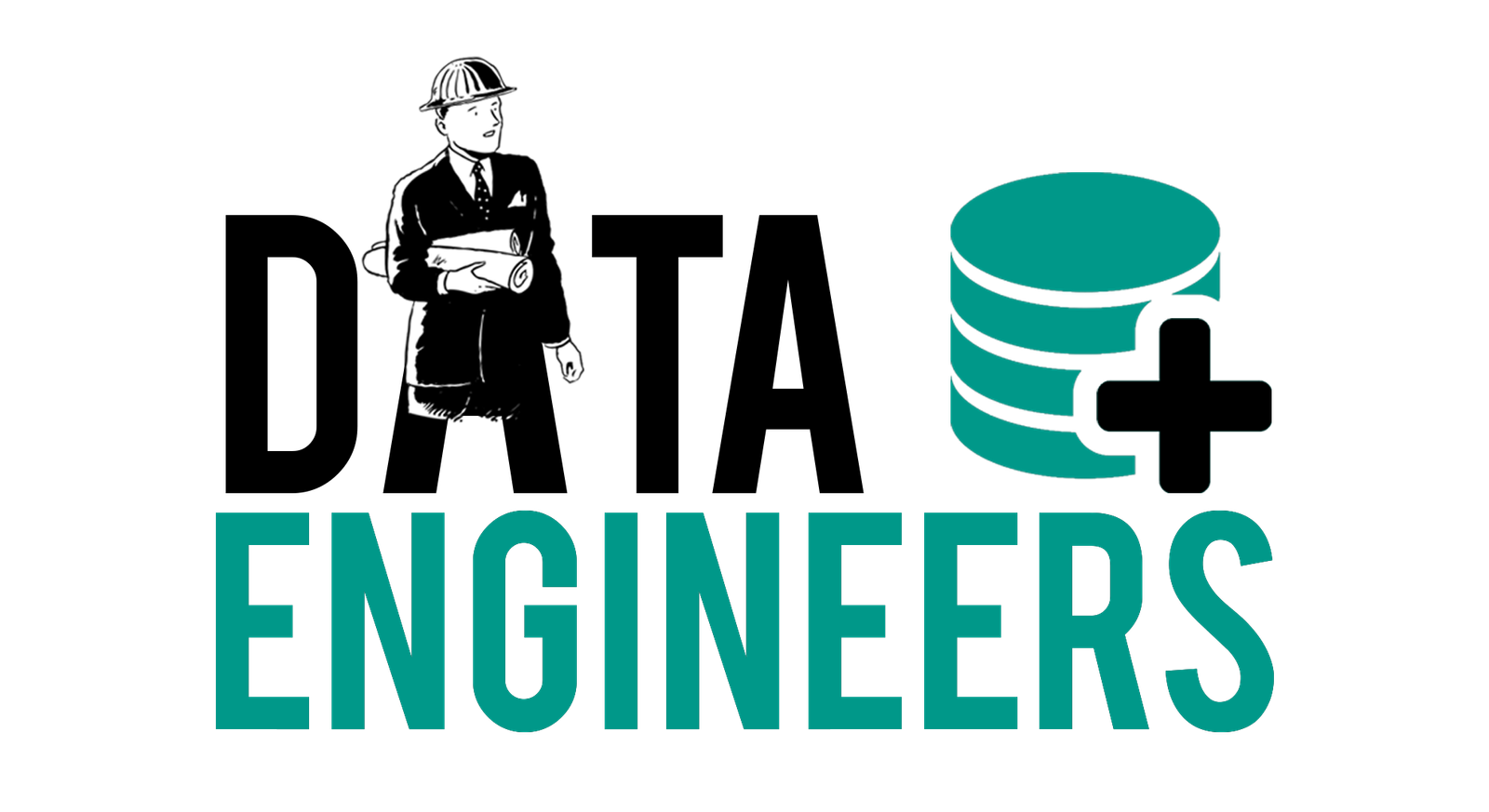
- 8 August, 2025
- Data Engineers
- 0 Comments
- Blog
What Are Signs of SSD Failure: How to Identify and Prevent Data Loss
Solid State Drives (SSDs) are widely praised for their speed, reliability, and durability. However, even SSDs can fail over time due to various SSD failure causes, leading to data corruption, SSD not recognized issues, or even complete drive failure. Understanding the warning signs of SSD failure and performing a SSD health check regularly can help prevent SSD data loss and costly downtime. In this guide, we’ll cover common SSD failure symptoms, how to troubleshoot SSD failure signs, and how to recover data from SSD failures.

🔋 How Long Do SSDs Last?
SSDs typically last between 5-10 years under normal usage, but their lifespan depends on several factors such as type of flash memory (SLC, MLC, TLC, QLC), usage patterns, and the amount of data written to the drive. While most SSDs are designed to handle millions of write cycles, they still wear out over time. When an SSD nears the end of its lifespan, it can show signs of SSD failure like slow performance, file system errors, or SMART errors.
🛑 Common Signs of SSD Failure: Symptoms You Shouldn’t Ignore

1. ⚡ Slow Performance and Write/Read Speed Issues
A sudden drop in SSD performance is often the first sign of failure. You may notice:
- ⏳ Slower boot times than usual.
- 🐢 Slow SSD read speed and slow SSD write speed when transferring files.
- ❄️ SSD freezing during use or delayed system responses while running programs.
This SSD slow performance could be due to SSD wear leveling failure or bad sectors. If these issues persist, use an SSD diagnostic tool to check for SSD read/write errors and run a SMART test to evaluate the drive’s health.
2. 💥 Frequent Freezes, Crashes, or Errors
Frequent system crashes or freezing—especially during startup or file transfers—could point to an SSD failure during transfer or other critical issues:
- 🚫 SSD boot issue where the drive fails to load the operating system.
- Errors like ❌ disk read error, 🖥️ SSD error message, or failure to boot.
- Unexpected 💻 blue screen of death (BSOD) related to disk read/write failures.
These are often linked to bad blocks, corrupted SSD files, or unreliable SSD performance.
3. 📁 Corrupted or Missing Files
If you encounter corrupted files that are suddenly unreadable or disappearing, this could be a sign of serious SSD failure:
- Files failing to open or applications crashing due to bad sectors.
- Documents, photos, or videos becoming inaccessible.
In such cases, it’s important to recover data from SSD as soon as possible using SSD data recovery software or professional SSD recovery services.
4. 🚧 Bad Sectors, SSD Wear Leveling, and Overuse

As your SSD ages, it may develop bad sectors where data cannot be written or read properly. If your SSD is showing bad blocks, it’s important to run a diagnostic tool that can identify these areas and assess the health of the drive.
- ⚠️ Bad sectors can severely affect SSD performance, and using the SSD past its healthy lifespan could lead to permanent data loss.
- 💾 Excessive write operations, such as those caused by write-intensive applications, can accelerate SSD wear leveling failure.
Use SMART diagnostic tools to check the wear leveling count and remaining lifespan of your SSD.
5. 🌡️ SSD Overheating or Abnormal Temperature
Excessive heat can significantly reduce the lifespan of an SSD and may cause SSD failure symptoms like:
- High 💥 SSD temperature leading to 🔥 overheating issues.
- The SSD becoming excessively hot or the system’s cooling fans working overtime.
If overheating persists, consider using a cooling solution and check whether your SSD is showing SMART errors related to high temperatures.
6. 🔌 Drive Not Detected or BIOS/Operating System Issues
A completely failed SSD may not be recognized by BIOS or the operating system. This could be a sign of:
- 🔧 Physical SSD damage due to hardware failure.
- A controller failure or NAND failure, where the drive’s components can no longer communicate properly with your system.
If your SSD is not detected, check the physical connections and consider SSD repair tools or data recovery services to retrieve files from the drive.
🛠️ How to Prevent SSD Failure

Although SSDs are not immune to failure, there are steps you can take to extend their lifespan and prevent common issues:
1. 💾 Regular Backups
Always maintain backup copies of important data to mitigate the risk of data loss in case of SSD failure. Use backup and restore software for easy and reliable backups.
2. ❄️ Use Proper Cooling
Keep your SSD at a safe operating temperature by ensuring that your computer or laptop has proper airflow. Overheating can lead to SSD controller failure and performance issues.
3. 📊 Monitor SSD Health
Use SSD diagnostic tools regularly to track the SMART status, check for bad sectors, and monitor the wear leveling of your SSD.
4. 🚫 Avoid Excessive Write Operations
Limit tasks that require heavy write operations, like running virtual machines or performing continuous video editing, as these can wear out your SSD faster.
5. 🔄 SSD Firmware Updates
Ensure that your SSD has the latest firmware updates to address any known bugs or performance issues. If the drive has firmware failure, an update might resolve problems and improve stability.
📋 Table: SSD Failure Signs and Troubleshooting
Warning Sign | Possible Cause | Troubleshooting Tip |
⚡ Slow performance | SSD wear, bad sectors | Use diagnostic tools to check health. |
💥 Frequent crashes or freezes | Corrupted files, excessive writes | Run disk checks, backup data. |
📁 Missing or corrupted files | Write errors, bad sectors | Use data recovery tools. |
🚧 Bad sectors or health errors | Excessive writes, memory degradation | Replace the SSD if errors persist. |
🌡️ Overheating or high temperature | Inadequate cooling Physical damage, hardware | Ensure proper airflow or add cooling. Check connections, consider data |
🔌 Not detected by BIOS/OS | failure | recovery services. |
📞 Need Help? We’re Here to Assist!
If you’re experiencing SSD failure symptoms, have questions about how to fix SSD failure, or need assistance with data recovery from SSD, our expert team at Data Engineers is here to help.
- Get professional SSD troubleshooting.
- Recover data from dead SSDs with reliable recovery tools.
- Contact us for best SSD diagnostic tools, SSD Data Recovery Services and advice on extending SSD life.

Worldwide Leader in Data Recovery

Professional Expertise with Long Term Experience
DATA ENGINEERS
011-26426316 | +91-9910132719 | +91-9818567981
support@dataengineers.in
Call us for a free advice.
Specialists at retrieving data from all types of hard drive and phone storage media, today Data Engineers has grown into the India’s largest and most technically capable data recovery company.

Leave a Comment